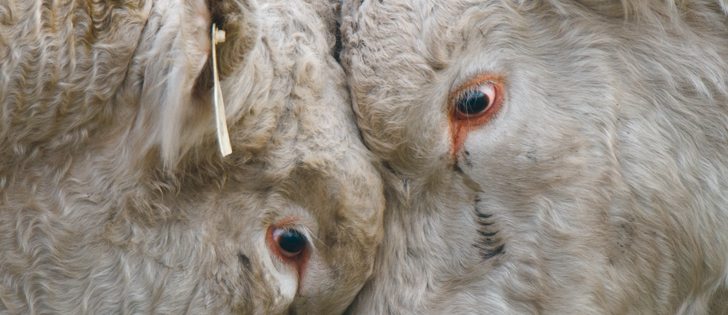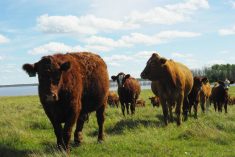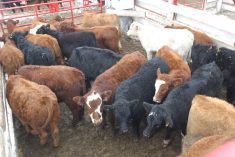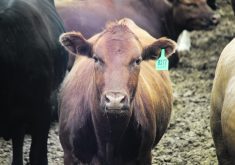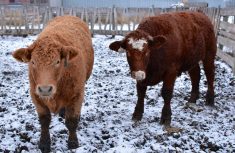Refundable or non-refundable? Cattle producers are split on how to fund Alberta groups through levies
CORRECTION – November 14, 2016 1000 CST – The Ontario Corn Fed Beef Program does not receive any money from the national beef checkoff. It does receive 50 cents per head from the Beef Farmers of Ontario.
Alberta’s refundable checkoff for beef cattle remains a bone of contention for producers, even though it has now been in place for six years.
Attendees at the Zone 1 and 2 Alberta Beef Producers meetings discussed it at some length, but opinions continue to conflict.
However, ABP has already asked the government to pass legislation allowing non-refundable checkoffs.
Read Also

Beef check-off collection system aligns across the country
A single and aligned check-off collection system based on where producers live makes the system equal said Chad Ross, Saskatchewan Cattle Association chair.
Producers at an Oct. 27 meeting in Brooks passed a resolution to withhold any increase to the national portion of the checkoff until the provincial portion, which ABP refers to as a service charge, is made non-refundable.
Alberta producers pay $3 per head, and $2 of that is refundable. The other $1 goes to national market and research initiatives and is non-refundable. The national portion is scheduled to rise to $2.50 next year.
“We’ve got to get a non-refundable checkoff on that $2 or we’re going to lose our own provincial organization, and that provincial organization doesn’t just represent us here in our province, it’s how we fund CCA (Canadian Cattlemen’s Association),” said Mark Francis of Taber.
“So it’s not that I’m against the $1.50 increase. What I’m saying is before we agree to that increase, we’ve got to get back to a non-refundable checkoff in Alberta.”
Francis said he feared the national levy increase combined with a Lethbridge County per-head tax of $3, which affects most southern Alberta feedlots, will encourage feedlots to ask for refunds on the refundable part of the checkoff.
That could jeopardize ABP’s finances.
As the largest dollar contributor to the CCA, reductions in Alberta’s financial contribution could jeopardize the national cattle group and its marketing and research initiatives.
At the Nov. 2 ABP meeting in Picture Butte, four feedlot owners spoke in support of the existing refundable checkoff and were critical of ABP’s efforts to return to a non-refundable levy.
“I’m in strong disagreement (to a mandatory checkoff),” said Rick Paskal.
“It seems to me you have a fair amount of dollars right now.”
Not everybody who requests a refund on Alberta’s portion asks for the entire amount to be returned, said Glen Thompson, adding he was “100 percent opposed” to a non-refundable checkoff.
This year, the ABP had 817 requests for a refund of the service charge, which amounted to $2.3 million. That is about 34 percent of the total service charge revenue collected.
ABP chair Bob Lowe said most of the refund requests come from cow-calf producers, but feedlot owners receive the bulk of the money refunded by the ABP.
Producers at both the Brooks and Picture Butte meetings were critical of provinces that claw back the national checkoff for use on their own projects. The national portion is non-refundable, but each province can allocate the national dollars where it sees fit.
Quebec claws back about 97 percent of its national levy and Ontario also claws back part of it for use in research and marketing.
It means less money is allocated to Canada Beef for marketing and promotion and to the Beef Cattle Research Council for research.
Feedlot owner Ryan Kasko of Picture Butte noted the Alberta issue involving feedlot owners who ask for refunds on their service fees.
His resolution that ABP and the Alberta Cattle Feeders Association “build a single and mutually agreeable modern governance funding model” was passed.
Kasko said such a model could funnel the refunded service charge funds directly to projects both groups support.




